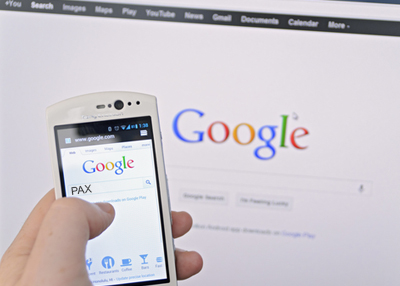How do you foster market growth through consumer choice? By tearing down any walls and impediments to innovation.
It appears that is what patent giant Google is trying to do with its recently-announced “PAX” cross-patent program. With the growing number of developers who are creating apps and online services specifically with the intent to run on Google’s Android devices, patent litigation in the Android arena has become a real barrier to innovation. Before new companies sign on to this presumptively peaceful program, we wanted to know how you see Google’s new cross-patent license proposal: peace pact or power play?
Android and PAX
 The word “pax,” of Latin origin, means “peace.” So, by all appearances, the PAX program is well-intended and designed to ultimately benefit the consumer. Under PAX, members grant one another royalty-free patent licenses covering their Android and Google apps on qualified devices. This means, you, fellow member, can use my patents in your applications for Android devices, and I can use yours in mine. PAX is free and open to any company in the business of making Android stuff. Google claims this “community-driven clearinghouse” developed with its Android partners is designed to ensure “innovation and consumer choice—not patent threats—[and] will continue to be key drivers of [its] Android ecosystem.”
The word “pax,” of Latin origin, means “peace.” So, by all appearances, the PAX program is well-intended and designed to ultimately benefit the consumer. Under PAX, members grant one another royalty-free patent licenses covering their Android and Google apps on qualified devices. This means, you, fellow member, can use my patents in your applications for Android devices, and I can use yours in mine. PAX is free and open to any company in the business of making Android stuff. Google claims this “community-driven clearinghouse” developed with its Android partners is designed to ensure “innovation and consumer choice—not patent threats—[and] will continue to be key drivers of [its] Android ecosystem.”
Android was already distributed under open-source licenses that allowed anyone to use the operating system for free, an “openness” that resulted in enormous freedom of choice among manufacturers and grew the Android ecosystem to include more than 400 partner manufacturers and 500 carriers with an astonishing 1.6 billion active users. That’s almost twenty percent of the entire world, using Android. “Why hinder that kind of growth?” Google asks. Currently, the founding nine members of the PAX community—some admittedly very big power players in the digital industry: Google, Samsung Electronics, LG Electronics, Foxconn Technology Group, HMD Global, HTC, Coolpad, BQ, and Allview—agree. These players also collectively own more than 230,000 patents worldwide, a number they intend to grow. Google encourages companies, large and small, around the world to join PAX and “enjoy patent peace.”
Understanding PAX
So, how does it work? The PAX website is surprisingly streamlined with: 1) a mission-statement-style home page; 2) an “Agreement” tab with a contact form requesting a copy of the license agreement; 3) a “Community” tab listing the nine current members of PAX identified above; and 4) a “Contact” tab with the identical contact form as the Agreement tab. The actual PAX license agreement cannot be accessed unless and until the contact form is submitted and the user agrees to the following:
“If we send you a copy of the PAX License, you shall only use it for your own internal evaluation regarding whether to join. You must use a reasonable degree of care to protect the PAX License and to prevent any unauthorized use or disclosure of the PAX License. You may share the PAX License with your employees, board of directors, or lawyers who need to see it, but only if they have agreed to keep it confidential. You may also disclose the PAX License when compelled to do so by law, providing Google notice if possible.”
Without knowing what potential legal rights—patent or otherwise—the companies who join are giving up in exchange for this royalty-free Android patent privilege, it is hard to assess. Could this be seen as Google using its own considerable clout—as well as that of its current high-profile PAX members, who hold thousands of patents and spend every day battling patent lawsuits—to attempt to disarm other companies of their intellectual property? Lawsuits from trolls as well as legitimate patent holders with valid patent infringement claims against these big-name players likely dwarf the number of patent lawsuits smaller companies face on a daily basis. Do you see a potential downside for smaller companies, that hold fewer patents, to joining Google’s recently announced PAX program?




 />i
/>i

